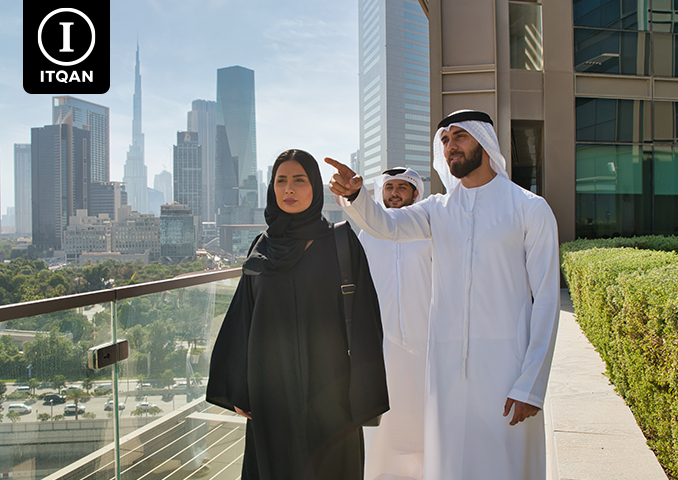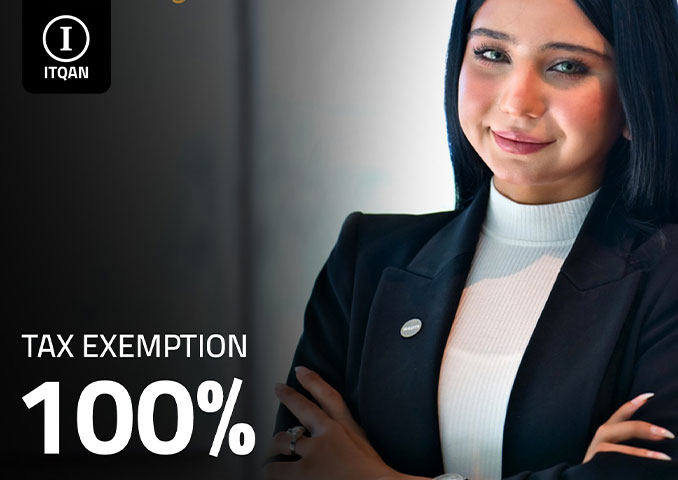In recent years, the UAE has witnessed remarkable economic growth and has become one of the most prominent investment destinations in the world. The UAE has a developed infrastructure and a favorable business environment that attracts investors from all over the world. Dubai and Abu Dhabi, the two main capitals, are global financial centers with multinational and multi-sector companies. A clear and transparent law and legislation system enhances confidence in the UAE financial market and helps attract foreign direct investments significantly. In this article, we will discuss the steps for investing in the UAE .
Thanks to its advanced economic strategy, the UAE seeks to promote economic diversification by investing in diverse sectors such as tourism, technology, energy, and education. In addition, the UAE government offers attractive incentives to startups and foreign investors to promote innovation, research and development.
Investment opportunities in the UAE are not limited to large companies only, but also extend to individuals seeking to diversify their investment portfolio through real estate, financial markets, or small and medium businesses.
In conclusion, investing in the UAE represents a fruitful option for investors looking for a stable, technologically advanced investment environment, and a strategic geographical location that easily connects the eastern and western markets.

Steps to invest in the Emirates
Steps to invest in the Emirates
Investing in the United Arab Emirates represents an important opportunity for international investors due to the stable economic environment and regulatory legislation that promotes economic growth and direct investments. Here are basic steps to invest in the UAE :
Research and analysis: Every successful investment begins with studying and analyzing the local market, and understanding the available opportunities and challenges. The investor must study different sectors such as real estate, tourism, technology, energy, and others.
Determine the investment objective: Based on the research, the investor should determine the main investment objective, whether it is commercial real estate, financial markets or emerging businesses.
Financial planning: The investor must develop an investment plan that includes determining the available budget, assessing potential risks, and determining the appropriate investment period.
Choosing local partners: In some cases, experienced local partners can be important to help navigate local legislation and local business culture.
Registration and Licenses: The foreign investor must ensure compliance with all local laws and legislation, and obtain the necessary licenses to start business.
Implementation and investment management: Once licenses are obtained and the investment structure is prepared, the investor can begin implementing plans and managing the investment effectively.
Monitoring and evaluation: The investor must regularly monitor investment performance, evaluate financial returns and overall performance, and take the necessary measures to improve performance if necessary.

Advantages of investing in the Emirates
Advantages of investing in the Emirates
Investing in the UAE has several advantages that make it an ideal destination for international investors. Here are some of these features:
Stable economic environment: The UAE has a stable economic environment and strong financial institutions, which enhances investor confidence and reduces financial risks.
Advanced investment legislation and policies: The UAE adopts investment legislation and policies that enhance legal protection for investors and encourage foreign direct investment.
A global financial and commercial center: Dubai and Abu Dhabi are considered global financial and commercial centers, providing investors with access to diverse markets and broad investment opportunities.
Advanced infrastructure: The UAE has an advanced infrastructure that includes modern airports, advanced sea ports, and advanced transportation networks, which facilitates international movement and trade.
Rewarding investment and tax incentives: The UAE offers lucrative tax incentives and privileges to companies and investors, which attracts capital and major projects.
Diversity of economic sectors: The UAE provides investment opportunities in various sectors such as real estate, tourism, technology, energy, and financial services, which allows diversifying the investment portfolio and reducing risks.
Multicultural work environment: The UAE lives in an environment that allows cultural and religious coexistence, making it an attraction for talent and competencies from all over the world.
Strategic geographical location: The UAE is located in a strategic geographical location between East and West, which facilitates access to the markets of the Middle East, North Africa, India and Central Asia.
Tips when investing in the Emirates
When it comes to investing in the UAE, here are some important tips to take into consideration:
Careful research and market analysis: Before embarking on any investment, the investor must conduct comprehensive research and analysis of the local market, and understand the economic trends and opportunities available in different sectors.
Review the legislation and legal controls: The investor must review the legislation and legal controls related to investment in the Emirates, and ensure full compliance with them to avoid any potential legal problems.
Choosing the appropriate investment sector: The investor should choose the sector that enjoys stability and economic growth in the Emirates, such as real estate, tourism, technology, and energy, according to the investment objectives and acceptable level of risk.
Taking advantage of government incentives: The UAE government offers lucrative financial and tax incentives to investors, so these opportunities must be exploited to reduce costs and increase returns.
Local Partnerships: Sometimes, partnerships with experienced local partners can be beneficial for new investors, as they can help overcome cultural hurdles and learn from local experiences.
Diversification in the investment portfolio: It is important to diversify the investment portfolio to reduce risks, by distributing investments among different assets such as real estate, stocks, and bonds.
Continuous monitoring and evaluation: The investor should regularly monitor the performance of his investments, evaluate the financial returns and overall performance, and take the necessary decisions to improve performance if necessary.
Preparing for economic changes: The investor must be aware of the economic and political changes that may affect the financial market in the Emirates, and be prepared to adjust his strategy according to these changes.
Investment costs in Dubai
Investing in Dubai can be an attractive option for investors thanks to the dynamic economic environment and diverse opportunities available, but new investors must be aware of the potential costs and expected returns before making any move. Investment costs in Dubai include several aspects:
- Cost of Real Estate: If the investment includes real estate, the investor should be aware of the cost of purchasing or renting, and additional costs such as registration fees, property taxes, and maintenance fees.
- Operating costs: Investors should calculate daily or annual operating costs, such as employee wage costs, maintenance costs, and management costs if necessary.
- Licensing and setback costs: There may be costs to obtain the necessary licenses to operate a business or investment in Dubai, in addition to tax or financial setback costs.
- Legal and accounting costs: There may be costs for legal and accounting consulting to ensure compliance with local laws, taxes and necessary financial reporting.
- Life and living costs: For investors who intend to live in Dubai while investing, they should take into account personal life and living costs, such as rent, food and transportation costs.
- Financial Risks: The investor must be aware of the potential financial risks of investing in Dubai , such as fluctuations in real estate prices, economic changes, and changes in government policies.
Permits and licenses required for investment in Dubai
Investing in Dubai is an attractive opportunity for investors looking for a dynamic and advanced investment environment, but to do so legally and effectively, the investor must obtain the necessary permits and licenses. These permits and licenses vary according to the type of investment activity and the sector to which the investment relates.
First, the most important licenses and permits that investors may need to obtain in Dubai are:
- Company License: Every investor in Dubai must obtain the appropriate company license for his or her business activity. There are several types of companies, such as limited liability companies, sole proprietorships, and partnership companies, and each type requires specific procedures for registration and obtaining a license.
- Building License: If the investment includes real estate projects, a building license is required from the Dubai Cities and Engineering Affairs Authority or the relevant authority, to ensure that the project is built in accordance with local standards and regulations.
- E-commerce license: In the case of investing in e-commerce, the company may need a special license from the Emirates Information and Communications Authority, and this requires compliance with a set of controls and conditions.
- Transport and Public Transport Licensing: If the investment relates to public or private transport services, it can require licensing from the Dubai Roads and Transport Authority, while adhering to appropriate standards and regulations.
- Work permit: Every investor needs a work permit for the company’s employees and workers, and this permit is obtained from the Ministry of Human Resources and Emiratisation or the competent authority.
The investor must be aware of the local regulations and laws related to investment in Dubai, and work to achieve full compliance with these laws to avoid any legal or administrative problems in the future.
Investment laws in Dubai
In light of the rapid development and economic growth in Dubai, the Emirate of Dubai has become a favorite destination for investors looking for diverse and encouraging investment opportunities. However, investing in this emirate requires compliance with a number of laws and regulations that regulate the financial market and ensure integrity and transparency in business. Among the main laws that investors must adhere to in Dubai, we can mention:
- Companies and Trade Law: This law regulates the establishment, management and operation of companies in Dubai, and specifies the types of companies allowed such as limited liability companies, partnerships and sole proprietorships. The law also includes the financial and legal rights and duties of companies and the responsibility of their owners.
- Foreign Investment Law: This law regulates the rules of foreign investment in Dubai, determines the sectors available for foreign investment, and the conditions and controls that foreign investors must adhere to to obtain the necessary licenses.
- Labor Law: This law regulates labor relations in Dubai, defines the rights and duties of workers and employers, and stipulates the conditions for employing workers and the procedures to be followed in the event of contracting and termination.
- Tax Law: This law defines the types of taxes applied in Dubai, such as value-added tax (VAT), corporate taxes, and real estate taxes, and explains the tax procedures that companies and individuals must adhere to.
- Real Estate Laws: Dubai real estate laws regulate real estate purchases, rentals, and real estate registration, and define ownership rights and financial duties related to real estate.
- Environmental and health regulations: Environmental and health regulations regulate the use of natural resources, and protect the environment and the health of the population from pollution and potential health risks as a result of economic activities.
Dubai is committed to providing an encouraging investment environment by strictly implementing and understanding these laws and regulations, which helps attract investors and achieve sustainable economic growth in the city. New investors should thoroughly familiarize themselves with these laws and regulations before starting any investment process in Dubai, and engage with local legal advisors to ensure full and proper compliance.
Our company’s role in investment steps in the Emirates
In conclusion, investing in the UAE , in cooperation with Itqan Company, is a strategic and smart step towards achieving economic and financial success. By benefiting from Itqan’s experience in the fields of investment and consulting, investors can direct their strategies more effectively and make the most of the opportunities available in the UAE market.
Investors are advised to follow clear and organized steps in the investment process, including careful research and economic analysis, reviewing the necessary laws and licenses, and consulting with local experts such as Itqan Company to guide them through each stage of the investment.
By using these steps and collaborating with Itqan, investors can achieve tangible results and profitable investments in the UAE market, while maintaining standards of integrity and legal compliance.
Frequently asked questions about the steps to invest in the UAE
What types of companies can I establish in the UAE?
You can establish several types of companies in the UAE such as limited liability companies, sole proprietorships, partnership companies, and branch companies of foreign companies.
What are the necessary procedures to establish a company in the UAE?
The basic procedures include applying for registration with the Department of Economy, obtaining an activity license from the relevant authorities, preparing the necessary contracts, and submitting the required documents such as passports and certificates.
What laws must be adhered to in order to invest in the UAE?
Laws related to corporations, foreign investment, taxes, labor, and real estate must be adhered to, as well as the necessary licenses for the chosen business activity.
What are the licenses and permits required to start working in the UAE?
Necessary licenses and permits include a company license, a construction license if the investment includes real estate projects, and work permits for foreign employees.
What are the tax advantages of investing in the UAE?
The UAE has attractive tax advantages, such as not imposing corporate income tax in most sectors, and charging value-added tax at a low rate.
